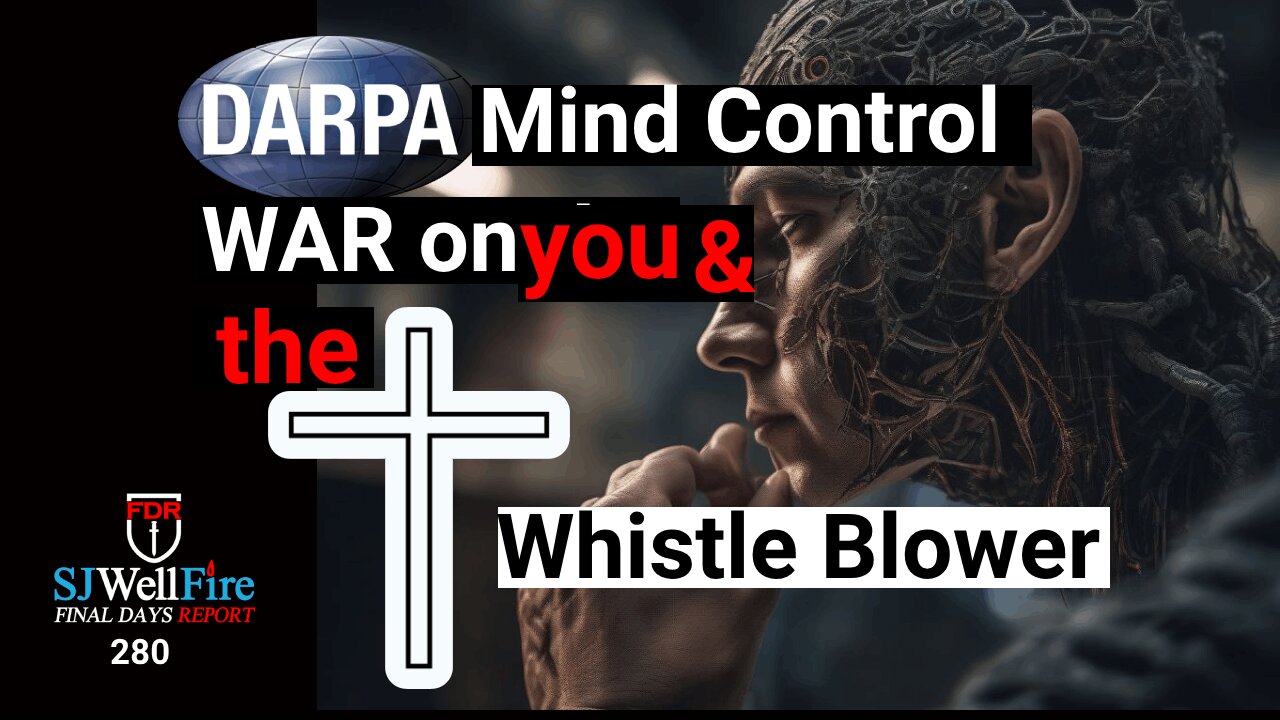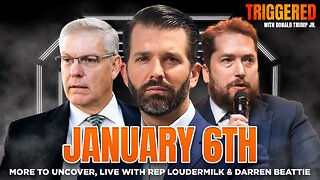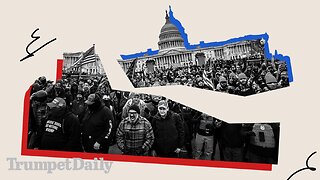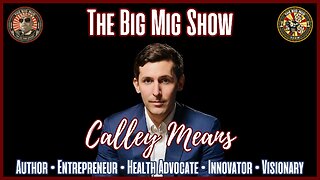Premium Only Content

Darpa Hates Christians - the evidence from a whistle blower
Save Souls with an OfGod Tshirt: https://sjwellfire.com/shop/
Join our newsletter: https://sjwellfire.com/
Gab: https://gab.com/sjwellfire
Support us to save souls via the news: https://sjwellfire.com/support/
or scott@sjwellfire.com paypal
Prepare: https://sjwellfire.com/partners/
Whistleblower Reveals Military Mind Control Project At Major University What if the government could change people's moral beliefs or stop political dissent through remote control of people's brains? Sounds like science fiction, right? Well, a leaked document reveals that the US government, through DARPA research, is very close to accomplishing this. Activist Post was recently contacted by an anonymous whistleblower who worked on a secret ongoing mind-control project for DARPA. The aim of the program is to remotely disrupt political dissent and extremism by employing "Transcranial Magnetic Stimulation" (TMS) in tandem with sophisticated propaganda based on this technology. TMS stimulates the temporal lobe of the brain with electromagnetic fields. Below are snippets from the research contract that call Christians Extremists. Christians are not doing false flags like the Boston Bombing covered by RT or hitting the pentagon with a missile or planting bombs in the building where the IT servers are that had the 2.3 missing trillion dollars. Christians are not running the drugs like Iran Contra Affair or Vietnam or Afghanistan. Please. I bind this evil mindcontrolism tech in the name of Jesus Christ.
INNOVATIVE CLAIMS Humans are storytelling beings. There is no clearer evidence of this than the struggles of the United States government to convince world populations of its good intentions, and to dissuade key constituencies from the powerful narratives told by violent extremists. In short, it is widely recognized that the U.S. is "losing the battle of the narrative" and thus, consequentially, the "war of ideas". This project responds to Technical Areas 1 and 2, with the aim of revolutionizing the study of the neuropsychology of narrative and its effects on persuasion. It will generate the knowledge to effectively understand, model, and disrupt narratives—systems of stories sharing themes, forms, and archetypes—on a neurological level, and the capability to induce powerful narrative phenomena (such as transportation and narrative validity) with certainty.
To achieve this goal we have assembled a transdisciplinary team from Arizona State University and the Barrow Neurological Institute. Members have expertise in neuropsychology, neuroimaging, narrative theory, persuasion and strategic communication, as well as religion and culture. The team will achieve four key innovations in research approach, theory, and practice. Integrate narrative theory, neuroimaging, and persuasive outcomes. Each of these areas has been studied independently, but no effort to date has tested responses of the brain to narrative, and correlated those to attitude and behavior change. Our design integrates these concepts in all three project phases, meaning that the neural underpinnings of narrative can be directly linked to practical strategic communication outcomes. Resolve conceptual problems in narrative and psychology of religion. Most narrative theory comes from humanities, which favors interpretive analysis of single narratives (or small sets thereof), and tends to discount generalizable, quantitative, empirical research. Further, studies of the psychology of religion have historically been based on a “measurement paradigm” that takes little account of narrative structure of religious messages
This project tests key narrative theories from communication, literary studies, and psychology in a design that will explain relative effects. It also uses stimuli based on religious master narratives—so often appropriated by extremist groups—to understand the psychological effects of particular message features and to attend to the relationship between narrative and political violence in contested populations, a small subset of which may engage in extremist behavior or financially, ideologically, or politically support extremists. Produce significant innovations in the study of the neuropsychology of narrative. While some research exists on how particular brain regions respond to narrative, none has identified brain networks that are responsible for narrative comprehension. This is a key shortcoming because the activity of any particular region is affected in complex ways by activity in other regions. Existing research also relies on fMRI methods that achieve poor temporal resolution. This prevents full understanding of how various regions work together over time to comprehend a narrative. Only by taking a holistic, multi-modal neuroimaging approach can we fully understand how narrative affects the brain.
7 III.A. STATEMENT OF WORK Scope This project integrates narrative theory, psychology of religion, neuropsychology, neuroimaging, and transcranial magnetic stimulation to describe, explain, and test the response of a Narrative Comprehension Network to stimuli based in religious master narratives. The project builds on a core within-subjects experimental design in the first phase, adding between- subjects manipulations in Phase II to test hypotheses about the functions of the network identified in that phase. Phase III seeks to manipulate key accessible areas via Transcranial Magnetic Stimulation to provide strong inferences about the role those areas play in comprehension.
Finally, this project will create a fundamental basis for understanding how to disrupt or enhance aspects of narrative structure, and/or brain functioning, to minimize or maximize persuasive effects on subject proclivity to engage in political violence.
Need for This Research
This project integrates insights from three mutually-informing theoretical terrains: (1) narrative networks in circulation in contemporary cultures, particularly those narratives that are appropriated by extremists to promote, support, and justify violence; (2) brain networks, the neural and cognitive pathways through which the brain processes narrative as measured by multi-modal brain imaging techniques; and, (3) meaning networks or the patterns of interpretation and influence—attitudinal, intentional and behavioral changes—that accrue when narrative neural networks are activated. We will focus on religious narratives partly because of the theoretical opportunities they provide and partly because of their power in catalyzing extremist behavior.
Subjects In this program of research we are focusing on members of two religious communities, Christians and Muslims . The choice of Christian and Muslim participants affords us a number of theoretical and practical opportunities. They share a number of key similarities for the purpose of our research, including several similar master narratives (e.g. they share cosmology, are monotheistic, and both are Abrahamic religions). They also have several importantly different master narratives (e.g. the primacy of Mohammed’s prophecy for Muslims, the divinity of Jesus for Christians). We can leverage these similarities and differences to design our stimuli. There are several advantages to choosing religious narratives. First, religion is ubiquitous; every culture has some form of religion, and most people in the world are religious. Even if they are not, religious narratives pervade cultures in ways that religious master narratives are familiar to people even if they are not personally religious (Cohen, 2009; Saroglou & Cohen, in press). Third, they are particularly evocative. Religious narratives are among a small set of kinds of narratives that can guide people’s ultimate concerns (Emmons, 2003), making people willing to devote their lives to the charitable service of others, to kill or die in the service of religion. We will also measure several individual difference variables related to religious outlooks: intrinsic religiosity, extrinsic religiosity, quest, and fundamentalism.
-
 40:56
40:56
SJWellFire: Final Days Report
3 days ago $1.03 earnedStrange Fog = Is this Smart Nano Tech Fog? Internet of Things..
6192 -
 1:08:03
1:08:03
Donald Trump Jr.
8 hours agoJanuary 6th: More to Uncover, Live with Rep Loudermilk & Darren Beattie | TRIGGERED Ep.205
109K178 -
 1:00:48
1:00:48
The StoneZONE with Roger Stone
1 hour agoJustin Trudeau Throws In The Towel! w/ Canadian Hockey Legend Theo Fluery | The StoneZONE
1.98K6 -
 LIVE
LIVE
We Like Shooting
11 hours agoDouble Tap 391(Gun Podcast)
215 watching -
 2:32:43
2:32:43
FreshandFit
11 hours agoAndrew Wilson VS Gary The Numbers Guy Astrology & Numerology Debate!
69K44 -
 LIVE
LIVE
Dr Disrespect
10 hours ago🔴LIVE - DR DISRESPECT - TRIPLE THREAT CHALLENGE - RIVALS, PUBG, WARZONE
2,315 watching -
 1:15:03
1:15:03
Dad Dojo Podcast
8 hours ago $0.03 earnedEP16: Parenting: Then vs Now
23K -
 53:58
53:58
Sarah Westall
2 hours agoBlack Pilled vs Learning Reality and Maintaining Perspective, AI Reality w/ Johnny Vedmore
27.2K -
 55:01
55:01
LFA TV
1 day agoJan. 6, 2021, vs. Jan. 6, 2025 | TRUMPET DAILY 1.6.25 7pm
19.3K1 -
 1:19:27
1:19:27
The Big Mig™
1 day agoLimitless Health with Calley Means
29K7